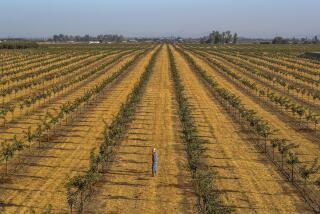Study Says Water Sales Won’t Hurt Farms : Resources: Rather than harming agriculture, a market would help the economy, the report concludes. But critics question its impartiality.
- Share via
Creation of a statewide water market in California that would let farmers sell their irrigation water to cities would not devastate the agricultural economy as many have feared, a study sponsored by business and urban water interests concludes.
The idea of water marketing has been pushed for several years by big cities, including Los Angeles, eager to find new sources. About 80% of the state’s water is used by agriculture, but many farmers object to parting with any of it for fear entire rural communities will be sucked dry.
The new study, to be released today in Sacramento, attempts to allay those concerns by analyzing the effects of selling 500,000 acre-feet of water a year, slightly less than the amount consumed yearly in the city of Los Angeles. By comparison, agriculture typically uses 27 million acre-feet of water annually.
The study concludes that the effect of sales would be “relatively small” on the agricultural economy compared to other factors, particularly if the transfers came from water-intensive field crops such as cotton, rice, wheat and other grains.
It found, for example, that farmers in 1991 voluntarily left fallow over 700,000 acres of land under the federal price support program, about 4 1/2 times more land than would need to be taken out of use to make the water available for sale.
“California’s emerging water market does not (portend) the end of California’s agricultural economy or spell disaster for the communities connected to it,” wrote David L. Mitchell, a San Francisco agricultural and resource economist who conducted the study for the Metropolitan Water District of Southern California and the Bay Area Economic Forum.
“Rather, by encouraging more efficient distribution and use of our most precious resource, the emerging water market will better enable us to prosper from economic opportunities that we, as a state, are currently letting slip by.”
The study acknowledged that some impacts of water sales, such as job losses among farm workers, would need to be addressed, and suggests a 10% surcharge on water sales to pay for local assistance and retraining of displaced workers. The potential job loss would be very small compared to unemployment caused by such technological advancements as the tomato harvester, the study said.
Officials from the MWD and the Bay Area Economic Forum, the leading proponents of increased water sales, called the report “objective evidence” that a statewide water market should be developed.
But after having been read the study’s findings by a reporter, several representatives of agricultural interests questioned its credibility.
“If they sponsored it hoping to provide a level of comfort to the farm community, I suspect they will fail,” said Mary-Ann Warmerdam, director of natural resources for the California Farm Bureau. “The farmers will look at the sponsors and make assumptions, valid or not.”
Don Upton, spokesman for the Westlands Water District in the Central Valley, said the study appears to underestimate the repercussions on farm communities. When a farmer stops growing crops, Upton noted, he also stops purchasing fertilizer, seeds, machinery and other goods related to crop production.
“As they say, the devil is in the detail,” Upton said.
But Tom Graff, senior attorney with the Environmental Defense Fund in Oakland and a longtime advocate of water marketing, said the study provides a “valuable addition” to the debate over water sales.
“They made an effort to produce real numbers and honest estimates,” Graff said. “Let’s have this debate on the basis of serious studies and not hyperbole and myth.”
More to Read
Sign up for Essential California
The most important California stories and recommendations in your inbox every morning.
You may occasionally receive promotional content from the Los Angeles Times.













